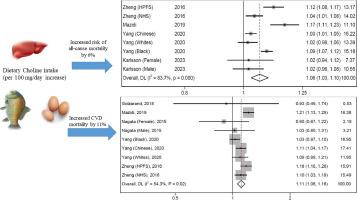Higher dietary choline intake is associated with increased risk of all-cause and cause-specific mortality: A systematic review and dose-response meta-analysis of cohort studies
IF 3.4
3区 医学
Q2 NUTRITION & DIETETICS
引用次数: 0
Abstract
Evidence indicates that choline and betaine intakes are associated with mortality. Based on the available evidence, we hypothesized that dietary choline and betaine do not increase mortality risk. This meta-analysis was conducted to investigate the association of dietary choline and betaine with mortality from all causes, cardiovascular diseases, and stroke. Online databases including PubMed, Scopus, Web of Science, Embase, and Google Scholar were searched up to 9 March 2024. Six cohort studies comprising 482,778 total participants, 57,235 all-cause, 9351 cardiovascular disease, and 4,400 stroke deaths were included in this study. The linear dose-response analysis showed that each 100 mg/day increase in choline intake was significantly associated with 6% and 11% increases in risk of all-cause (RR = 1.06, 95% CI: 1.03, 1.10, I2 =83.7%, P < .001) and cardiovascular diseases mortality (RR = 1.11, 95% CI: 1.06, 1.16, I2 = 54.3%, P = .02) respectively. However, dietary betaine, was not associated with the risk of mortality. Furthermore, the result of the nonlinear dose-response analysis showed a significant relationship between betaine intake and stroke mortality at the dosages of 50 to 250 mg/day (Pnon-linearity= .0017). This study showed that each 100 mg/day increment in choline consumption was significantly associated with a 6% and 11% higher risk of all-cause and cardiovascular disease mortality respectively. In addition, a significant positive relationship between betaine intake and stroke mortality at doses of 50 to 250 mg/day was observed. Due to the small number of the included studies and heterogeneity among them more well-designed prospective observational studies considering potential confounding variables are required.

膳食中胆碱摄入量的增加与全因和特定原因死亡风险的增加有关:队列研究的系统回顾和剂量反应荟萃分析
有证据表明,胆碱和甜菜碱的摄入量与死亡率有关。根据现有证据,我们假设膳食胆碱和甜菜碱不会增加死亡风险。本荟萃分析旨在研究膳食胆碱和甜菜碱与各种原因导致的死亡率、心血管疾病和中风之间的关系。截至 2024 年 3 月 9 日,我们检索了包括 PubMed、Scopus、Web of Science、Embase 和 Google Scholar 在内的在线数据库。本研究共纳入了六项队列研究,共有 482,778 人参与,57,235 人死于全因,9351 人死于心血管疾病,4,400 人死于中风。线性剂量-反应分析显示,胆碱摄入量每增加 100 毫克/天,全因死亡风险(RR = 1.06,95% CI:1.03,1.10,I2 = 83.7%,P = .001)和心血管疾病死亡风险(RR = 1.11,95% CI:1.06,1.16,I2 = 54.3%,P = .02)分别显著增加 6% 和 11%。然而,膳食中的甜菜碱与死亡风险无关。此外,非线性剂量-反应分析结果显示,甜菜碱摄入量为 50 至 250 毫克/天时,与中风死亡率之间存在显著关系(P 非线性= 0.0017)。该研究显示,胆碱摄入量每增加 100 毫克/天,全因死亡率和心血管疾病死亡率风险就会分别增加 6% 和 11%。此外,还观察到甜菜碱摄入量与中风死亡率之间存在明显的正相关关系,剂量为 50 至 250 毫克/天。由于所纳入研究的数量较少,而且这些研究之间存在异质性,因此需要更多考虑到潜在混杂变量的设计良好的前瞻性观察研究。
本文章由计算机程序翻译,如有差异,请以英文原文为准。
求助全文
约1分钟内获得全文
求助全文
来源期刊

Nutrition Research
医学-营养学
CiteScore
7.60
自引率
2.20%
发文量
107
审稿时长
58 days
期刊介绍:
Nutrition Research publishes original research articles, communications, and reviews on basic and applied nutrition. The mission of Nutrition Research is to serve as the journal for global communication of nutrition and life sciences research on diet and health. The field of nutrition sciences includes, but is not limited to, the study of nutrients during growth, reproduction, aging, health, and disease.
Articles covering basic and applied research on all aspects of nutrition sciences are encouraged, including: nutritional biochemistry and metabolism; metabolomics, nutrient gene interactions; nutrient requirements for health; nutrition and disease; digestion and absorption; nutritional anthropology; epidemiology; the influence of socioeconomic and cultural factors on nutrition of the individual and the community; the impact of nutrient intake on disease response and behavior; the consequences of nutritional deficiency on growth and development, endocrine and nervous systems, and immunity; nutrition and gut microbiota; food intolerance and allergy; nutrient drug interactions; nutrition and aging; nutrition and cancer; obesity; diabetes; and intervention programs.
 求助内容:
求助内容: 应助结果提醒方式:
应助结果提醒方式:


